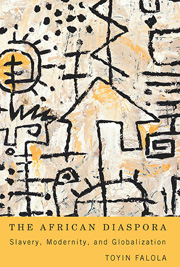Book contents
- Frontmatter
- Dedication
- Contents
- Preface and Acknowledgments
- Introduction: The Old and New African Diaspora
- Part 1 The Old Diaspora: Slavery and Identity Politics
- Part 2 An African Case Study: Yoruba Ethnicity in the Diaspora
- Part 3 The New Diaspora: Transnationalism and Globalization
- Postscript: United States Foreign Policy on Africa in the Twenty-First Century
- Notes
- Bibliography
- Index
Postscript: United States Foreign Policy on Africa in the Twenty-First Century
Published online by Cambridge University Press: 05 September 2013
- Frontmatter
- Dedication
- Contents
- Preface and Acknowledgments
- Introduction: The Old and New African Diaspora
- Part 1 The Old Diaspora: Slavery and Identity Politics
- Part 2 An African Case Study: Yoruba Ethnicity in the Diaspora
- Part 3 The New Diaspora: Transnationalism and Globalization
- Postscript: United States Foreign Policy on Africa in the Twenty-First Century
- Notes
- Bibliography
- Index
Summary
President Barack Obama said in a speech in Accra on July 11, 2009, “The twenty-first century will be shaped by what happens not just in Rome or Moscow or Washington, but by what happens in Accra as well.” This is an important moment in the relations between the United States and Africa for a variety of reasons. The first is symbolic: President Obama has a direct link to African origins because his father is from Kenya. Thus he is claimed as an African son and as an African American, a dual identity and citizenship that he has to negotiate. He is clever to draw on both when political exigencies permit. He is a member of the new diaspora able to solidify his credentials by tapping into the identity of the old diaspora represented by his wife, Michelle Obama.
The second reason arises from the symbolic: What will an African/black person in power do for Africa? The expectation is that he will do much, and his administration will alter US-African relations toward a more positive direction and infuse it with more energy. This assumption is based on both the politics of kinship and of identity. The third reason correlates with the symbolic: If a black person is in power in the United States, in what ways would it affect race and race relations? Some scholars originally framed his ascension to power as revolutionary, describing it in terms of a transition to a postracial era in the United States that would extend to other parts of the world.
- Type
- Chapter
- Information
- The African DiasporaSlavery, Modernity, and Globalization, pp. 343 - 360Publisher: Boydell & BrewerPrint publication year: 2013



